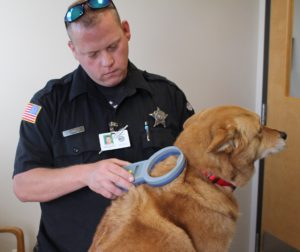Microchip Clinic will keep your pets safe
By Anne Eickstadt
Editor
Boone County Animal Services is offering a Microchip Clinic on Sept. 1. The clinic, which will be held from 10 a.m. to 2 p.m. at the Animal Services facility at 4546 Squaw Prairie Road, will also offer to clip your pets’ nails, distribute pet food (for as long as supplies last), give tours of the facility, and have a Lucky Duck game for kids.
Operations Supervisor Roger Tresemer answered a few questions for me.
How does micro-chipping work?
A microchip is a radio-frequency identification transponder (RFID) that is implanted under an animal’s skin and is a permanent means of identification. Each microchip has a unique serial number that can be read by a microchip scanner. Dogs, cats, horses, birds, reptiles and most animals can be micro-chipped. A microchip is not a tracking device but can be read by a scanner within a few inches of where it is implanted. It allows for identification for pets that may have slipped their collar or lost their tags. Most microchips can be effective up to 20 years or more.
How do you microchip an animal?
The microchip is about the size of a grain of rice and is administered through a sterilized needle. In dogs and cats, the microchip is generally administered under the skin between the shoulder blades. It is just like a pet getting its vaccinations.
How long does it take?
The actual procedure is less than 30 seconds. Collecting and recording the owner/pet information can take about 4 to 5 minutes.
Does it hurt?
The microchip is administered through a larger gauge needle but not much different than an animal receiving a vaccine. The animal will feel a slight pinch.
Is it dangerous?
No. There have been no reports of any adverse side affects due to a microchip.
Why should I have my pet micro-chipped?
The main reason to have a pet micro-chipped is it allows for a lost pet to be identified. Also, there have been cases of pet theft that the actual owner could be identified due to the micro-chip.
How much does it cost?
Boone County Animal Services charges $15 per microchip implant. The cost can range from $15 to $45 depending on the shelter or veterinary clinic.
Is this a one-time cost or do I have to keep paying per month?
The registration costs depends upon which microchip company your shelter or veterinarian uses. Anyone that has their animal micro-chipped through Boone County Animal Services is not required to…
For complete article, pick up the Aug. 8 BDR.




